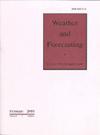菲律宾多周热带气旋预报的评估
IF 3.1
3区 地球科学
Q2 METEOROLOGY & ATMOSPHERIC SCIENCES
引用次数: 0
摘要
为了提供菲律宾天气预报所涵盖的传统时间尺度之外的热带气旋(TC)预报,本研究检查了该国多周(即从第1周到第4周)的TC预报技能。验证了2020年10月6日至2021年10月31日NCEP气候预报系统第2版(CFSv2)、欧洲中期天气预报中心集合预报系统(ECMWF)和NCEP全球集合预报系统第12版(GEFSv12)三个集合预报模式的TC预报结果。结果表明,在北太平洋西部以110°-155°E和0°-27°N为界的区域内,ECMWF模式对多周TC的预测始终是最准确的。ECMWF模型的命中率在0.25 ~ 0.31之间,虚警率在0 ~ 0.33之间,平均威胁得分最高。与此相反,GEFSv12和CFSv2模型具有不同的技能,前者在前两周表现更好,后者在更长的交付时间内表现更好。三种模式普遍低估了风暴的观测次数、风暴日数和累积气旋能量。此外,研究表明,在第1周之后,预测TC轨迹向观测轨迹右侧有显著的位置偏差(p<0.05),并且在第1周和第2周的传播速度往往比观测速度慢。这些发现有助于更好地理解这些集成模型的优势和局限性,这些模型有助于最终提供菲律宾多周TC预报。本文章由计算机程序翻译,如有差异,请以英文原文为准。
Evaluation of Multi-Week Tropical Cyclone Forecasts in the Philippines
In the pursuit of providing tropical cyclone (TC) forecasts beyond the conventional timescales covered by weather forecasting in the Philippines, this study has examined the multi-week (i.e., from Week-1 to Week-4) TC forecast skill in the country. TC forecasts derived from three ensemble models, namely: NCEP Climate Forecast System version 2 (CFSv2), European Centre for Medium-Range Weather Forecasts Ensemble Prediction System (ECMWF), and NCEP Global Ensemble Forecast System version 12 (GEFSv12) from 06 October 2020 to 31 October 2021 were verified. Results revealed that the ECMWF model is consistently the most skillful in multi-week TC prediction over the domain bounded by 110°–155°E and 0°–27°N in the western North Pacific. The ECMWF obtained hit rates ranging from 0.25 to 0.31, low false alarm rates of 0–0.33, and the highest equitable threat scores among the models. In contrast to this, the GEFSv12 and CFSv2 models had varying skills, with the former performing better in the first two weeks and the latter in longer lead times. It is further revealed that the three models generally underestimate the observed number of storms, storm days, and accumulated cyclone energy. Moreover, the study shows that the forecast TC tracks have a significant (p<0.05) positional bias toward the right of observed tracks beyond Week-1, and that they tend to propagate slower than observations especially in Week-1 and Week-2. These findings contribute to better understanding the strengths and limitations of these ensemble models useful for eventual provision of multi-week TC forecasts in the Philippines.
求助全文
通过发布文献求助,成功后即可免费获取论文全文。
去求助
来源期刊

Weather and Forecasting
地学-气象与大气科学
CiteScore
5.20
自引率
17.20%
发文量
131
审稿时长
6-12 weeks
期刊介绍:
Weather and Forecasting (WAF) (ISSN: 0882-8156; eISSN: 1520-0434) publishes research that is relevant to operational forecasting. This includes papers on significant weather events, forecasting techniques, forecast verification, model parameterizations, data assimilation, model ensembles, statistical postprocessing techniques, the transfer of research results to the forecasting community, and the societal use and value of forecasts. The scope of WAF includes research relevant to forecast lead times ranging from short-term “nowcasts” through seasonal time scales out to approximately two years.
 求助内容:
求助内容: 应助结果提醒方式:
应助结果提醒方式:


